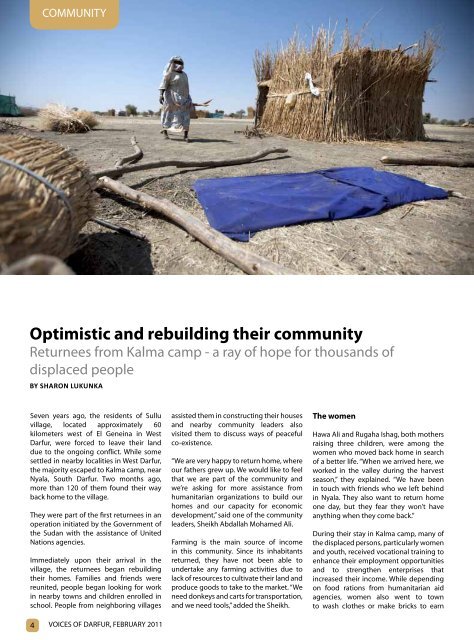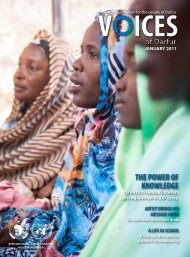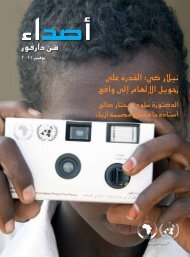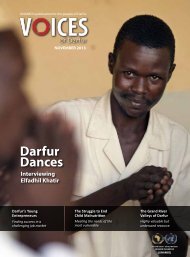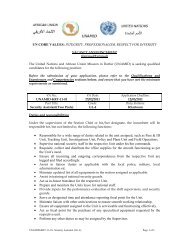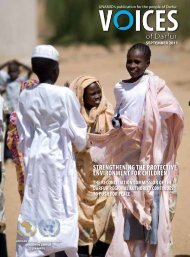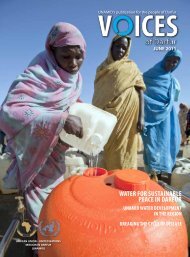OFFERING A BETTER FUTURE FOR STREET CHILDREN
English - Unamid
English - Unamid
- No tags were found...
You also want an ePaper? Increase the reach of your titles
YUMPU automatically turns print PDFs into web optimized ePapers that Google loves.
COMMUNITY<br />
Optimistic and rebuilding their community<br />
Returnees from Kalma camp - a ray of hope for thousands of<br />
displaced people<br />
BY Sharon Lukunka<br />
Seven years ago, the residents of Sullu<br />
village, located approximately 60<br />
kilometers west of El Geneina in West<br />
Darfur, were forced to leave their land<br />
due to the ongoing conflict. While some<br />
settled in nearby localities in West Darfur,<br />
the majority escaped to Kalma camp, near<br />
Nyala, South Darfur. Two months ago,<br />
more than 120 of them found their way<br />
back home to the village.<br />
They were part of the first returnees in an<br />
operation initiated by the Government of<br />
the Sudan with the assistance of United<br />
Nations agencies.<br />
Immediately upon their arrival in the<br />
village, the returnees began rebuilding<br />
their homes. Families and friends were<br />
reunited, people began looking for work<br />
in nearby towns and children enrolled in<br />
school. People from neighboring villages<br />
4 VOICES OF DARFUR, FEBRUARY 2011<br />
assisted them in constructing their houses<br />
and nearby community leaders also<br />
visited them to discuss ways of peaceful<br />
co-existence.<br />
“We are very happy to return home, where<br />
our fathers grew up. We would like to feel<br />
that we are part of the community and<br />
we’re asking for more assistance from<br />
humanitarian organizations to build our<br />
homes and our capacity for economic<br />
development,” said one of the community<br />
leaders, Sheikh Abdallah Mohamed Ali.<br />
Farming is the main source of income<br />
in this community. Since its inhabitants<br />
returned, they have not been able to<br />
undertake any farming activities due to<br />
lack of resources to cultivate their land and<br />
produce goods to take to the market. “We<br />
need donkeys and carts for transportation,<br />
and we need tools,” added the Sheikh.<br />
The women<br />
Hawa Ali and Rugaha Ishag, both mothers<br />
raising three children, were among the<br />
women who moved back home in search<br />
of a better life. “When we arrived here, we<br />
worked in the valley during the harvest<br />
season,” they explained. “We have been<br />
in touch with friends who we left behind<br />
in Nyala. They also want to return home<br />
one day, but they fear they won’t have<br />
anything when they come back.”<br />
During their stay in Kalma camp, many of<br />
the displaced persons, particularly women<br />
and youth, received vocational training to<br />
enhance their employment opportunities<br />
and to strengthen enterprises that<br />
increased their income. While depending<br />
on food rations from humanitarian aid<br />
agencies, women also went to town<br />
to wash clothes or make bricks to earn


